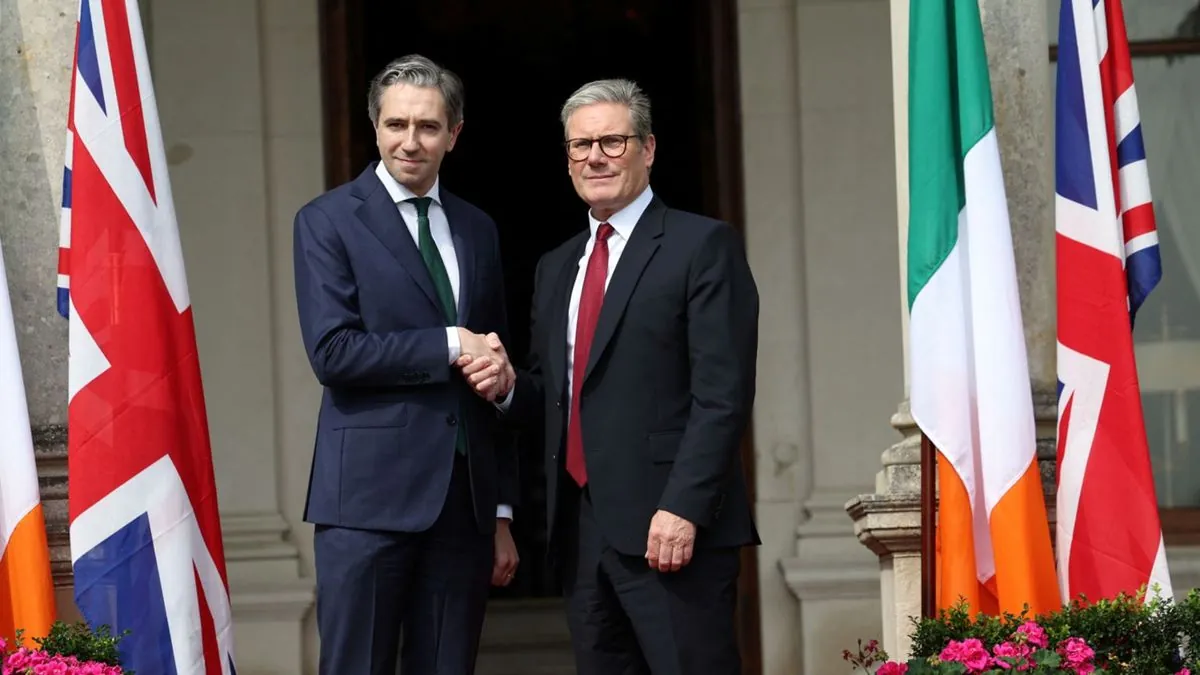Starmer's EU Reset Plan Sparks Brexit Concerns Among Unionists
Sir Keir Starmer's visit to Ireland and pledge to reset EU relations raises eyebrows. Loyalist MP warns of potential Brexit reversal, as Labour's history fuels skepticism.

Sir Keir Starmer's recent visit to Ireland has ignited discussions about the future of UK-EU relations, particularly concerning Northern Ireland and Brexit. The Labour leader's pledge to "reset" border and trade relations with the Republic of Ireland has drawn attention from various political quarters.
On 2024-09-07, Starmer met with Irish Premier Simon Harris in Dublin, marking the first visit by a UK Prime Minister to Ireland in five years. This meeting, occurring just nine weeks into Starmer's premiership, underscores the Labour government's commitment to strengthening ties with Ireland and the EU.
During his visit, Starmer announced plans for annual bilateral summits focusing on trade and security, aimed at reducing friction between Ireland and the United Kingdom. He stated:
"We are also resetting our relationship with the EU and I have made it very clear that I want a closer relationship with the EU. That is of course on security, on defence, but also on trade, reducing the friction and any business here in Ireland will tell you that reducing the friction helps and so we want to reset that relationship."
However, these developments have raised concerns among unionists in Northern Ireland. Sammy Wilson, the Democratic Unionist Party (DUP) MP for East Antrim, expressed apprehension about the potential implications for Brexit. Wilson suggested that Northern Ireland could be used as a pretext for undoing Brexit or further sacrificed in negotiations with the EU.
The DUP, founded in 1971, has been a staunch supporter of maintaining Northern Ireland's position within the United Kingdom. The party's concerns reflect the complex political landscape shaped by the 1998 Good Friday Agreement, which has been a cornerstone of the Northern Ireland peace process.
Wilson pointed out the Labour Party's historical opposition to Brexit, reminding that Starmer had previously advocated for a second referendum. This history fuels skepticism among Brexit supporters about Labour's intentions regarding the UK's relationship with the EU.
The situation is further complicated by the Northern Ireland Protocol, implemented as part of the Brexit withdrawal agreement. This protocol has been a source of contention, affecting trade between Great Britain and Northern Ireland.
As the UK-EU Trade and Cooperation Agreement, signed on December 30, 2020, continues to shape post-Brexit relations, Starmer's approach to EU engagement will be closely scrutinized. With approximately 49% of the UK's total trade in goods and services involving the EU, the economic implications of any policy shifts are significant.
The Labour government's actions in the coming months will be critical in determining the future of UK-EU relations, the status of Northern Ireland, and the broader implications for Brexit. As Wilson emphasized, unionists will be watching these developments "very carefully."


































